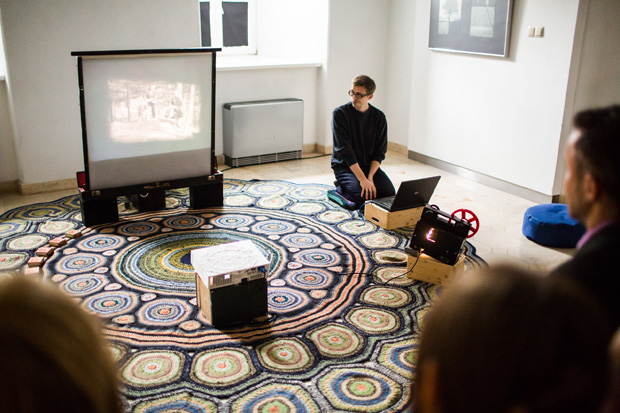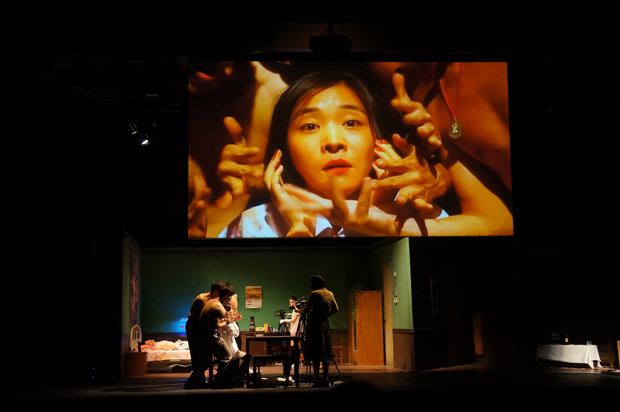Under the Radar 2018: Margarete and Thunderstorm 2.0

(© Konfrontacje)
by Zachary Stewart
It's 2018: Do you know where your analog home movies are? Polish theater-maker Janek Turkowski provokes a twinge of insecurity with his intimate and softly upsetting multimedia solo performance, Margarete, which is based around the discarded 8mm films of one East German woman named Margarete Ruhbe.
Turkowski purchased these secondhand memories at a flea market near the German-Polish border. Taken in the latter half of the 20th century, they feature the typical subjects: family, friends, pets, and the occasional visit to a major Eastern Bloc tourist attraction. Ruhbe had a particular fondness for long shots of rolling Baltic scenery, making passages of this show quite dull. Turkowski kneels next to the projector screen for the duration, noting the locations and speculating on the identities of the people in the picture. Since he wasn't there for the original filming, though, he cannot offer the kind of real behind-the-scenes insight that an uncle might when narrating a video of a family trip to Yugoslavia.
What he can do is place them in context, but Turkowski steadfastly avoids tying Ruhbe and her life a larger geopolitical drama — an almost irresistible temptation for a show about a German woman who was born in Latvia in 1909 and lived to be 101. In his sober, slightly melancholic delivery, Turkowski remains focused on Ruhbe herself, a choice that finally pays off when he manages to track her down in a nursing home and ask her a few questions about the footage.
The personal tone of the piece is reflected in the presentation, which is for only 12 audience members at a time. Turkowski tries to affect a homey comfort, offering us tea in mismatched china as we enter the second floor classroom that has been dressed up to look like a parlor. We sit on saggy upholstered furniture surrounded by incandescent floor lamps. A doily rests haphazardly over the projector (grandmotherly set design by Turkowski and Wiesława Turkowska). Unfortunately, the colorfully patterned rug can only partially disguise the cold tile. In a way, it is fittingly awkward: These videos are refugees, having lost their original home. They will never perfectly fit anywhere else, but their host can try to make the best of it with a little humanity.
In a final, haunting image, Turkowski shows his own original video of the flea market, shooting box after box of castaway photographs. Doubtlessly, the people who snapped them were grasping for a shred of immortality, as we all are when we point and click. The democratization of video and photography has allowed us to capture a moment forever, but it has also produced a mountain of images that few people will even bother to climb once their original subjects have passed.

(© Wang Chong)
by Kenji Fujishima
Thunderstorm 2.0, a production of the Chinese experimental theater company Théâtre du Rêve Expérimental that recently made its North American premiere at the Under the Radar Festival, is, on a basic level, a modern updating of a seminal work of Chinese theater, Cao Yu's 1934 play Thunderstorm. But director and coscriptwriter Wang Chong, the company's founder and artistic director, has more on his mind than mere modernization.
As has been the case with the Théâtre's previous productions, Thunderstorm 2.0 also aims to be a multimedia experience. Thus, camerapeople follow the actors onstage and capture their performances, with the live footage projected onto a big screen situated above the actors, and with video director Yang Fan handling the filmed elements in the manner of a live telecast. But the presence of two pingtan performers, Jiang Xiaobo and Xie Yan, creating the dialogue and soundtrack onstage while the actors pantomime their parts silent-movie-style suggests that Wang is also interested in evoking Chinese artistic traditions of the past while looking ahead aesthetically.
Perhaps because Wang has incorporated so many different media elements into Thunderstorm 2.0, he has drastically simplified what was, in Cao Yu's play, a sprawling dysfunctional family melodrama down to its barest essentials: two lower-class women who discover they're both being cheated on by the same rich man. If Thunderstorm could be accused of having an excess of plot, though, Thunderstorm 2.0's streamlined plot seems thin even for the 75 minutes it takes to tell it, as if Wang were less interested in the story and characters themselves than in the technologically forward-thinking way in which he tells it.
Those onstage cameras — with some of the cast members doubling as camera operators and stunt doubles — turn out, to some degree, to be more interesting than the story line and characters themselves. Even a last-minute attempt to give topical relevance to the drama — with the two pingtan performers suddenly breaking out of character and engaging in casual conversation with each other, making jokey references to Harvey Weinstein and Donald Trump — feels tacked-on at best.
Thunderstorm 2.0 doesn't need such heavy-handed references, because the multimedia elements are provocative enough in that regard. With camerapeople moving fluidly throughout Li Yi's three-room set design, Wang's take on Cao Yu's text suggests a period melodrama seen through a Big Brother-style reality TV prism (only the presence of a cassette player over which two of the characters erotically flirt suggests that this is taking place in a more recent time). And amid the technical gimmickry, hints of sharp class and gender critiques peek through, with the two women characterized as being stuck in an endless cycle of exploitation, both of them at the mercy of a heartlessly seductive rich man as they try to marry up in status and thus forge a better life for themselves. There's much to mull over in Thunderstorm 2.0, even if Wang Chong's production ultimately ends up playing more as an interesting experiment in storytelling than a satisfying drama in its own right.










